Can the Sun Change Your Eye Color? Understanding the Science Behind It
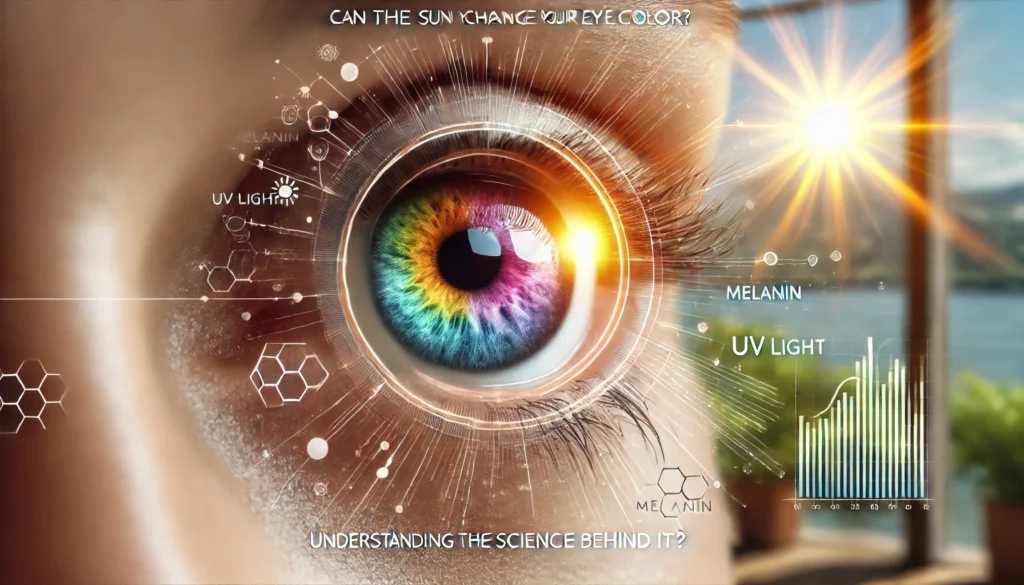
- Can the Sun Really Change Your Eye Color?
- How Melanin and Eye Color Work Together
- Can Eye Color Change in the Sun? The Science Behind Perceived Changes
- Sun Gazing and Eye Color: Myth vs. Reality
- Can the Sun Permanently Change Eye Color?
- Protecting Your Eyes from Sun Damage
- How Sun Affects Eye Color Perception & Protection Tips
- Conclusion: Can the Sun Change Your Eye Color?
Have you ever noticed your eye color appearing different after a day in the sun? Many people are curious if sun exposure can change their eye color, or if it’s just an optical illusion. The truth is, while the sun can make your eyes appear slightly different, it doesn't permanently change your eye color. In this article, we'll explore the science behind how sunlight interacts with eye color, debunk common myths, and provide expert advice on how to protect your eyes from harmful UV rays.
Can the Sun Really Change Your Eye Color?
The short answer is no—sun exposure cannot permanently change your eye color. Your eye color is determined by genetics, particularly by the amount of melanin in the iris. Melanin is the pigment that gives your eyes their color, and once your eyes develop their final color during childhood, that color typically doesn’t change.
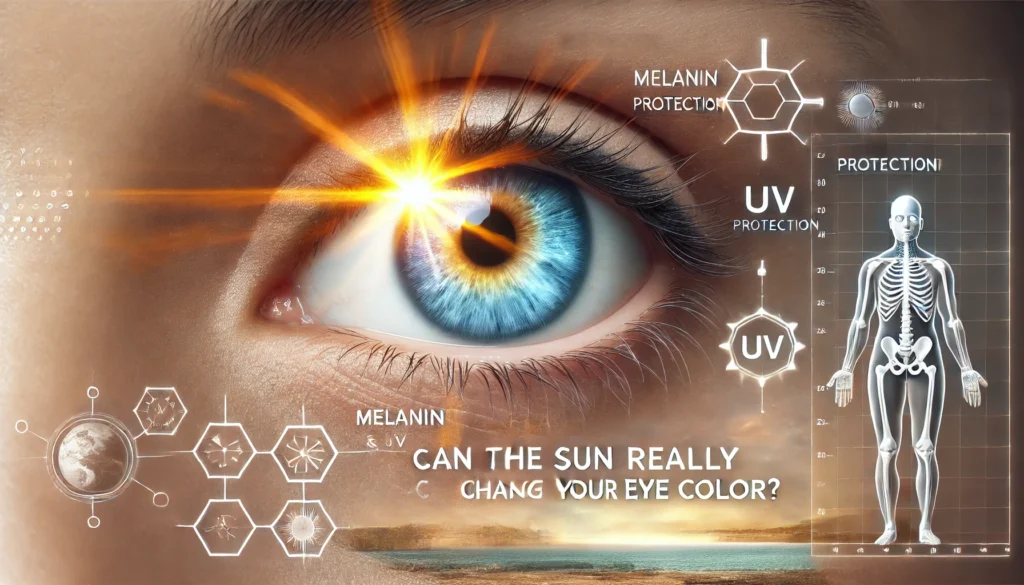
Temporary Changes vs. Permanent Changes
While sun exposure cannot permanently alter your eye color, it can cause temporary changes in how your eyes appear. This effect is due to pupil contraction and the way light reflects off the iris. When you’re outside on a sunny day, your pupils become smaller to limit the amount of light entering your eyes. This exposes more of your iris and makes the color of your eyes appear more intense.
- Example: If you have brown eyes, the sunlight can enhance the warm tones in your iris, making them appear richer or darker. On the other hand, blue or green eyes may appear brighter due to the way light interacts with the less pigmented iris.
Key Point: These changes are purely visual and temporary. They do not represent a true shift in the pigment of the iris.
Understanding the MC1R Gene and Changes in Eye Color: What You Should Know
How Melanin and Eye Color Work Together
Eye color is a result of how much melanin is in your iris. People with dark brown eyes have higher amounts of melanin, while those with blue, green, or gray eyes have less. Melanin serves as a natural protector against UV radiation, meaning darker eyes are better equipped to handle sun exposure.
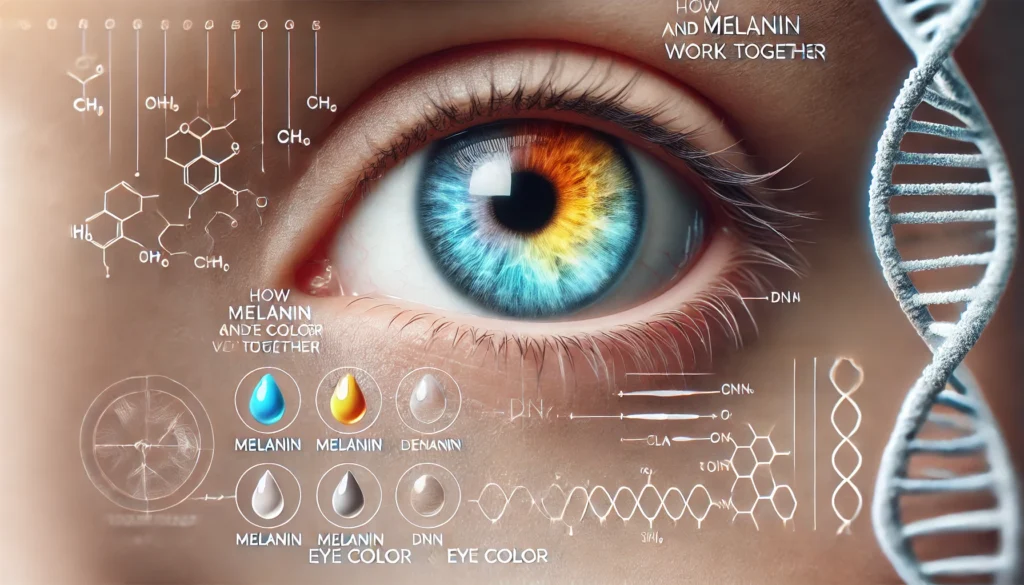
Can the Sun Stimulate Melanin in the Eyes?
Unlike the skin, which can tan in response to sun exposure, the melanin in your eyes does not change or increase when exposed to sunlight. This means that the sun won’t make your eye color darker or lighter over time.
- Fact: People with lighter eyes tend to be more sensitive to sunlight and UV exposure because they have less melanin in their irises to block harmful rays.
Why Does Eye Color Look Different in the Sun?
The illusion of your eye color changing in the sun is primarily due to pupil constriction and light reflection. When your pupils constrict in bright light, more of the colored part of your eye is visible, making the color appear more vivid. Additionally, the way sunlight reflects off the iris can enhance certain hues, causing a temporary shift in how your eye color is perceived.
- Pro Tip: Use sunglasses with 100% UV protection to reduce the intensity of light entering your eyes and protect against long-term damage.
What Changes Eye Color? Understanding the Science and Surgical Options
Can Eye Color Change in the Sun? The Science Behind Perceived Changes
Many people wonder if can the sun change your eye color or if it’s simply a trick of the light. Let's explore this further:
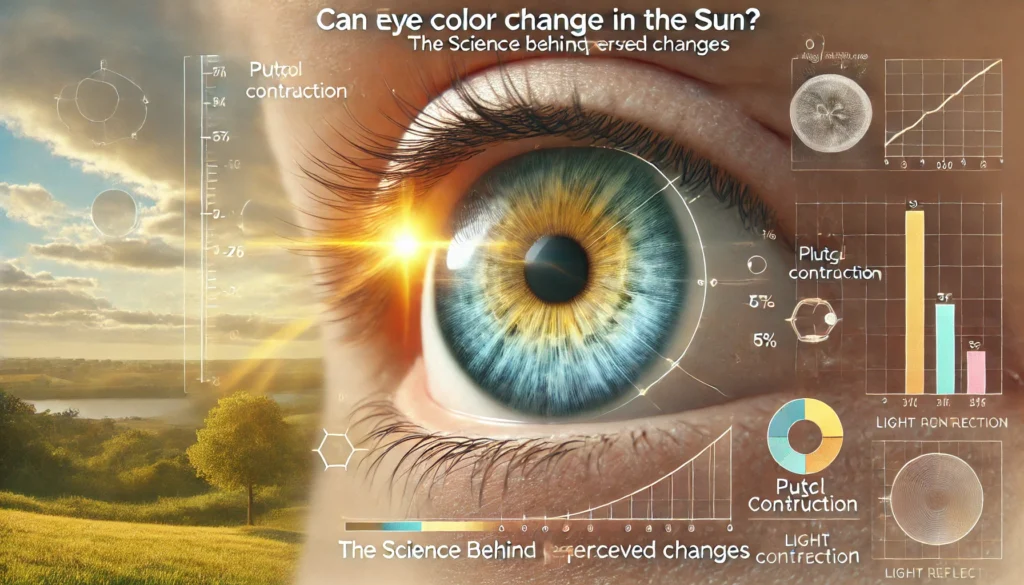
Melanin and Eye Protection
As mentioned, melanin not only determines the color of your eyes but also plays a crucial role in protecting them from UV damage. People with darker eyes have more melanin, which provides better natural protection against the harmful effects of the sun. On the other hand, those with lighter eyes (like blue or green) are at a higher risk of UV-related damage.
- Fact: People with light eyes are more susceptible to conditions like photokeratitis (sunburn of the cornea) and cataracts.
The Impact of Light Sensitivity on Eye Color
Because light eyes have less melanin, they are more sensitive to bright light. In sunny conditions, people with light-colored eyes may feel discomfort and squint more often. This reaction can also make the eyes look lighter or brighter when exposed to intense sunlight.
- Key Insight: Light-colored eyes may appear more vibrant in the sun, but this is due to lighting conditions and pupil dilation, not an actual change in eye color.
Sun Gazing and Eye Color: Myth vs. Reality
A trend known as sun gazing—staring directly at the sun in hopes of changing eye color—has circulated online. However, there is no scientific evidence to support the idea that sun gazing can permanently change your eye color.
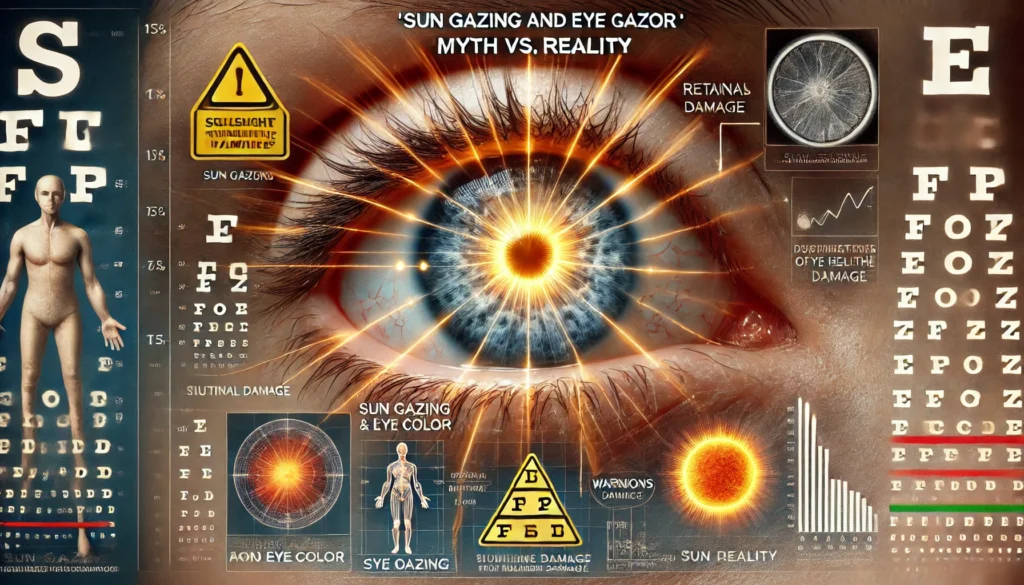
The Dangers of Sun Gazing
Sun gazing is dangerous and can cause severe damage to your eyes, including retinal burns, permanent vision loss, and macular degeneration. Direct exposure to the sun without protection can also increase the risk of eye cancer.
- Warning: Never attempt sun gazing to change your eye color. The damage caused by direct sunlight far outweighs any temporary effects it may have on how your eye color appears.
Important Note: If you want to change your eye color, consider safe options like colored contact lenses or consult with a specialist about permanent procedures like laser eye color change or iris implants.
Can the Sun Permanently Change Eye Color?
In general, the sun does not permanently change your eye color. However, certain medical conditions can cause noticeable shifts in eye color.
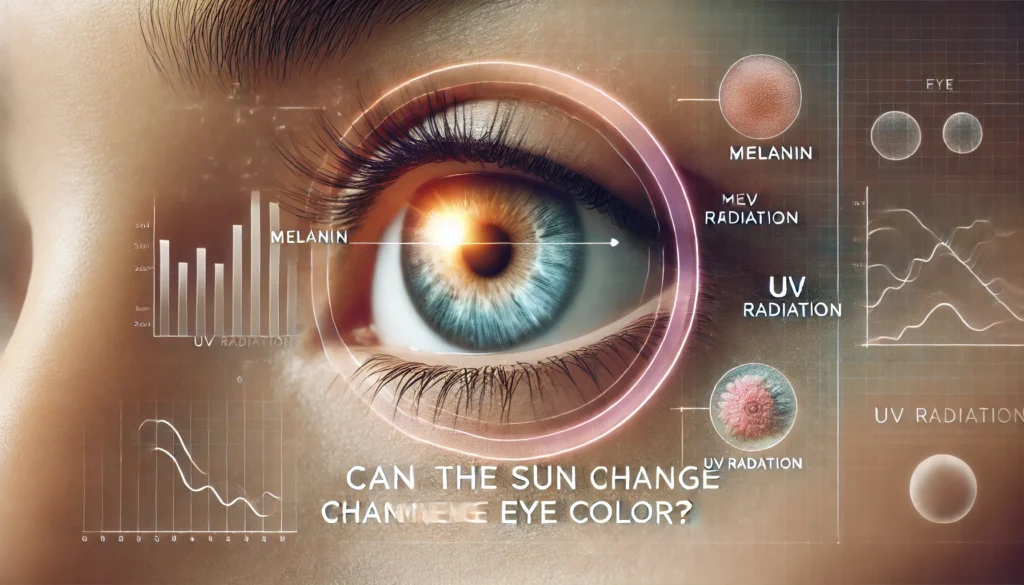
Medical Conditions That Can Cause Eye Color Changes
If you notice a sudden or dramatic change in your eye color, it may be a sign of an underlying medical condition. Conditions like Horner's syndrome or Fuchs' heterochromic iridocyclitis can cause the affected eye to become lighter or change colors over time.
- Horner’s Syndrome: Affects the nerves that control the eye muscles and can result in a lighter-colored iris.
- Fuchs' Heterochromic Iridocyclitis: A rare condition that can cause one eye to become lighter due to chronic inflammation.
Rare Changes in Eye Color: Exploring Heterochromia and Eye Color Shifts
If you observe sudden changes in your eye color, it’s important to consult an eye care professional to rule out any serious health conditions.
Protecting Your Eyes from Sun Damage
While sun exposure doesn’t change your eye color permanently, it can still damage your eyes. Here are some ways to protect your eyes from harmful UV rays:
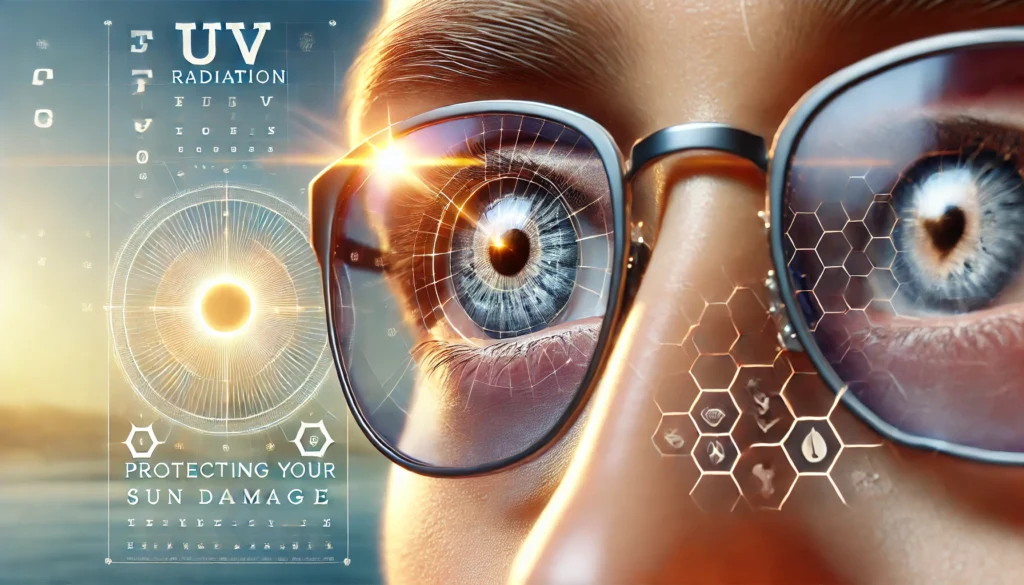
Wear Sunglasses with UV Protection
The best way to protect your eyes from UV damage is by wearing sunglasses that block 100% of UVA and UVB rays. Look for sunglasses with a UV 400 rating for maximum protection.
- Pro Tip: Always wear sunglasses, even on cloudy days, as UV rays can penetrate cloud cover.
Use a Wide-Brimmed Hat
For added protection, pair your sunglasses with a wide-brimmed hat. This will provide shade for your eyes and reduce direct exposure to sunlight.
- Fact: Wearing a wide-brimmed hat can cut down on UV exposure to your eyes by up to 50%.
Avoid Peak Sun Hours
The sun’s rays are strongest between 10 a.m. and 4 p.m. Try to limit your time outdoors during these hours to reduce UV exposure. If you must be outside, make sure to wear protective eyewear and stay in the shade when possible.
How Sun Affects Eye Color Perception & Protection Tips
Sun's Effect on Eye Color Perception
Eye Protection Tips
Wear UV-blocking sunglasses
Use a wide-brimmed hat
Avoid peak sun hours (10am-4pm)
Remember
Conclusion: Can the Sun Change Your Eye Color?
To summarize, sun exposure cannot permanently change your eye color, but it can make your eyes appear more vibrant or darker temporarily due to pupil contraction and light reflection. The sun can enhance certain tones in your iris, especially for those with brown or hazel eyes, but this effect is only temporary.
Frequently Asked Questions: Can Sun Exposure Change Eye Color?
Can sun exposure permanently change your eye color?
No, sun exposure cannot permanently change your eye color. The color of your eyes is determined by genetics, and while sunlight can make your eyes appear darker or more vibrant, it does not cause a permanent shift in color.
Why do my eyes look lighter in sunlight?
In bright sunlight, your pupils constrict, which makes more of your iris visible. This can make light-colored eyes, such as blue or green, appear brighter or lighter due to the way sunlight interacts with the iris.
Can sun gazing change eye color?
No, sun gazing cannot change your eye color. In fact, staring directly at the sun can cause severe damage to your eyes, including retinal burns and permanent vision loss. It is important to avoid sun gazing to protect your eye health.
Are lighter-colored eyes more sensitive to the sun?
Yes, lighter-colored eyes, such as blue, green, or gray, have less melanin in the iris, making them more sensitive to bright light and UV exposure. This is why people with lighter eyes often need extra protection, like sunglasses with UV filters, when outdoors.
How can I protect my eyes from sun damage?
The best way to protect your eyes from sun damage is to wear sunglasses that block 100% of UVA and UVB rays. Additionally, wearing a wide-brimmed hat and avoiding direct sunlight during peak UV hours (10 a.m. to 4 p.m.) can help reduce exposure.
Can medical conditions cause changes in eye color?
Yes, certain medical conditions like Horner's syndrome or Fuchs' heterochromic iridocyclitis can cause changes in eye color. If you notice a sudden or significant change in your eye color, it’s important to consult an eye care professional.
While the sun won’t change your eye color, prolonged exposure to UV rays can damage your eyes, making UV protection essential. If you're interested in changing your eye color permanently, consider laser eye color change or iris implant surgery—but always consult with a qualified professional first.

Leave a Reply